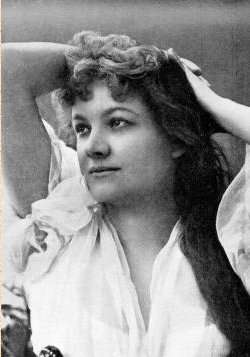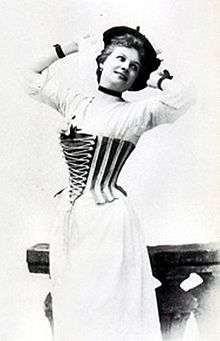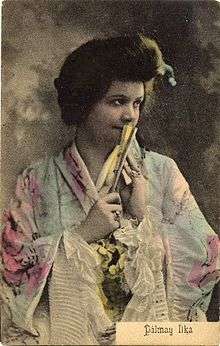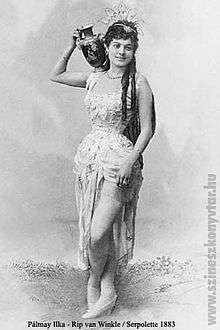Ilka Pálmay

Ilka Pálmay (often erroneously written Ilka von Pálmay; 21 September 1859 – 17 February 1945), born Ilona Petráss, was a Hungarian-born singer and actress. Pálmay began her stage career in Hungary by 1880, and by the early 1890s, she was creating leading roles in opera and operetta at the Theater an der Wien in Vienna. She was married to Austrian Count Eugen Kinsky in the early 1890s.
In 1895, Pálmay began to perform in London, and in 1896 she created the leading role of Julia in Gilbert and Sullivan's The Grand Duke. In 1897, Palmay returned to Hungary and spent most of the rest of her long and successful career in Hungary and Austria. She continued to perform until 1928.
Life and career
Pálmay was born in Ungvar, in the Ung County of the Kingdom of Hungary (present-day Ukraine). She was married twice, first to actor-manager József Szigligeti (from 1877 to 1886), and then to Austrian Count Eugen Kinsky in the early 1890s, who maintained an estate at Althofen in Carinthia.[1]
Early career
Pálmay began her stage career in Hungary (including Košice, Budapest and Kolozsvár) by 1880 and played about two dozen roles in the 1880s, including Serpolette in Les Cloches de Corneville[2] In the early 1890s, she performed at the Theater an der Wien in Vienna, where she created leading roles in Carl Zeller's Der Vogelhändler (1891) and Johann Strauss II's Fürstin Ninetta (1893).[3] Soon, she was playing in Prague and the Unter den Linden Theater in Berlin. There, in 1893, she was scheduled to appear in a German production of The Mikado in drag as the tenor hero, Nanki-Poo, and Sullivan took action to try to prohibit her from appearing in the role. Later, Pálmay was surprised to find out that no woman had ever appeared on stage at the Savoy Theatre dressed as a man.[4]

She later played the title role in La belle Hélène (Offenbach); Fiametta in Boccaccio (von Suppé); Denise in Mam'zelle Nitouche (Hervé; Nebántsvirág in Hungarian); Yvonne in The Pirate King (Planquette); Yum-Yum in The Mikado (Sullivan); the title role in The Grand Duchess of Gerolstein (Offenbach); Lisbeth in Rip Van Winkle (Planquette); and Bronislawa in A koldusdiák – The Beggar Student (Karl Millöcker).[5]
In June 1895, she made her first appearance on the London stage as a guest artist with the Ducal Court Theare Company of Saxe-Coburg-Gotha as Christel in five performances of Der Vogelhändler at the Drury Lane Theatre. W. S. Gilbert saw her there and hired her to play the leading role of Julia Jellicoe in The Grand Duke, expanding the role to take advantage of her comic talents.[4] Pálmay earned very favourable notices from the critics.[6] Pálmay signed a two-year contract with the D'Oyly Carte Opera Company, but The Grand Duke ran for only four months in 1896. After it closed, she created the role of Felice in His Majesty at the Savoy in the spring of 1897. His Majesty gave Pálmay opportunities to display her talents as ballad singer, opera soprano and comedian, including the chance to sing in German, the language in which she usually performed. The song, "Das Kleine Fraülein Müffchen," is a German version of "Little Miss Muffet". Pitting the weak-voiced George Grossmith against the histrionic Pálmay may have speeded his departure from the production after only four performances.[7] Pálmay next appeared as Elsie in the revival of The Yeomen of the Guard in the summer of 1897. Pleading ill health, she left D'Oyly Carte in July 1897.[3]
Later years
Pálmay appeared in Vienna in 1898-99, but she spent most of her career in Budapest. In 1905, she appeared briefly in German-language theatre in New York, but soon returned to Hungary. In 1911, she won the national Hungarian theatre's honorary prize. Pálmay played many roles from opera and operetta during her long career, as noted below. In 1928, she retired from performing.[3]
Pálmay recorded two songs in Vienna in 1900 and several in Budapest in 1903. The latter group of songs included one in English, "Butterfly," a folk song. She also recorded "Madrigal" from Ninoche and "A Little Bit of String" from The Circus Girl. All of these can be heard on The Art of the Savoyard (Pearl GEMM CD 9991).[3]
Writing as Countess Kinsky, Pálmay eventually published her memoirs in Hungarian. They were published in Berlin in 1911 in German translation as Meine Erinnerungen (My Memories). A chapter of the book about her days at the Savoy was translated into English by Andrew Lamb and was printed in the May and September 1972 issues of The Gilbert & Sullivan Journal. In the memoir, she describes plans by D'Oyly Carte to produce a musical version of Victorien Sardou's Madame Sans-Gêne in the company's 1897–1898 season, but those plans were cancelled.[3]
Pálmay died in Budapest at the age of 85.
Roles


- Giacomo Puccini/David Belasco: Madama Butterfly – Cio-Cio-San
- Ferenc Csepreghy: Sárga csikó (Yellow Foal) – Erzsike (Elizabeth)
- Ferenc Csepreghy: A piros bugyelláris (The Red Purse) – Török Zsófi (Turkish girl Zsófi)
- Ferenc Csepreghy: A tót leány – Misu
- Gilbert and Sullivan: The Grand Duke – Julia Jellicoe (in English, London)
- Gilbert and Sullivan: The Yeomen of the Guard – Elsie Maynard
- Gilbert and Sullivan: The Mikado – Yum-Yum (in Germany)
- Károly Gerő: Vadgalamb (Culver) – Rica a pásztorlány (Rica the shepherdess)
- Charles Grisart: A királykisasszony bábui – Les Poupées de l'Infante – main role
- Hervé: Mam'zelle Nitouche (Nebántsvirág in Hungarian) – Denise
- Hennequin & Millaud: Niniche – Niniche
- Charles Lecocq: Nap és hold (Le Jour et la Nuit) – Manola
- Charles Lecocq: The Gardener Girl – Micaela
- Alexander MacKenzie: His Majesty - Felice (in English, London)
- Andre Messager: A beárni leány – La béarnaise – the main role
- Karl Millöcker: A koldusdiák (Der Bettelstudent - The Beggar Student) – Bronislawa
- Karl Millöcker: Gasparone – Carlotta
- Jacques Offenbach: La Grande-Duchesse de Gérolstein (The Grand Duchess of Gérolstein) – the title role
- Jacques Offenbach: La belle Hélène – Hélène
- Jacques Offenbach: Orpheus in the Underworld – Eurydice
- Robert Planquette: Rip van Winkle – Lisbeth
- Robert Planquette: The Pirate King – Yvonne
- Robert Planquette: Les Cloches de Corneville – Serpolette, the good-for-nothing.
- Robert Planquette: A komédiás hercegnő – main role
- Jenő Rákosi: Magdolna – Magda
- Jenő Rákosi: Szélháziak – Cseresnyés Alfréd, the lawyer
- Franz von Suppé: Boccaccio – Fiametta
- Johann Strauss II: The Gypsy Baron – Barinkay
- Johann Strauss II: Das Spitzentuch der Königin (The Queen's Lace Handkerchief) – main role
- Johann Strauss II: Fürstin Ninetta (Princess Ninetta) - title role
- Franz Schubert - Besté: Három a kislány – Tscöllné
- Joseph Szigeti: Csókon szerzett vőlegény – Ábrai Irén színésznő
- Carl Zeller: Der Vogelhändler - Christel (Milka in Hungarian)
- Émile Zola: Nana (based on Zola's novel) – main role
Further reading
In English:
- Theatre Notebook - A Journal of the History and Technique of the British Theatre, 1945.
- Anon: The Romance of a Famous Theatre / The Old Savoy and The New - London, Curwen Press, 1930.
- W. S. Gilbert: The Savoy Operas - London, Macmillan Co., Ltd., 1926; 4th reprint 1935.
- Ayre, Leslie (1972). The Gilbert & Sullivan Companion. London: W.H. Allen & Co Ltd. Introduction by Martyn Green.
- Stedman, Jane W. (1996). W. S. Gilbert, A Classic Victorian & His Theatre. Oxford University Press. ISBN 0-19-816174-3.
- Wolfson, John (1976). Final curtain: The last Gilbert and Sullivan Operas. London: Chappell in association with A. Deutsch. ISBN 0-903443-12-0
In German:
- Honegger Marc – Marsenkeil Günther: Das große Lexikon der Musik, 1-8 – (The Large Encyclopedia of Music, 1–8), Freiburg, 1976-1983.
- Lexikon der Frau, 1-2 – Zürich (Women Encyclopedia, 1-2 – Zurich), 1953.
- Das Jahrbuch der Wiener Gesellschaft. Beiträge zur Wiener Zeitgeschichte - Wien (The Yearbook of the Viennese Society. Contributions to Viennese Contemporary History – Vienna), 1929
- Biographisches Lexikon des Kaisertums Österreich. 1–60 – Wien (Biographic Encyclopedia of Kaiser’s Austria. 1–60 – Vienna), 1856-1891.
In Hungarian:
- Magyar Színházművészeti Lexikon – Akadémiai Kiadó, (Hungarian Theatre Lexicon, Academic Edition), Budapest, 1994.
- Gyula Krúdy: Primadonna – Regényes történet Pálmay Ilkáról, aki meghódította a világot. - Móra Könyvkiadó (Primadonna – About Ilka Pálmay and her world. Móra Publications), Budapest, 1988.
- Magyar Életrajzi Lexikon 1-3. Budapest, 1981–1982.: Színészmúzeum / Pálmay Ilka – Magyar Színházi Intézet, (Hungarian Biography: Theatre Museum / Ilka Pálmay – Hungarian Theatrical Institute) Budapest, 1981–1982.
- Hont-Staud: Színházi kislexikon – Gondolat Kiadó (Concise Theatrical Lexicon – Gondolat Edition) , Budapest, 1969.
- Dr. Dezső Bánóczi: Rendezte dr. Bánóczi Dezső – Szerzői magánkiadás, (Staging by Dr Dezső Bánóczi – Copyright Private Issue) Budapest, 1943.
- Dr. Antal Németh: Színészeti lexikon – Győző Andor kiadása (Theatrical Lexicon – Győző Andor’s issue), Budapest, 1930.
- Révai mickle lexicon / Pálmay Ilka (Révai’s Large Lexicon / Pálmay Ilka – Révai’s issue), Budapest , 1911–1927.
- Kálmán Porzsolt: Blaha Lujza emlékalbum (Blaha Lujza’s Memorial Album) – Budapest, 1926.
- György Verő: A Népszínház Budapest színi életében (Budapest People’s Theatre – The Colours of Its Life) – Budapest, 1926.
- Gróf Kinskyné Ilka Pálmay: Emlékirataim – Singer és Wolfner Kiadó (Countess Kinsky, Ilka Pálmay: My Memoirs), Budapest, 1912
- Sándor Bródy: Színésznők (Actresses) – Budapest, 1905.
- Mihály Báthory-Románcsik: Magyar színészek és színésznők életrajzai (Hungarian actors and actresses) – Kassa, 1883.
Notes
- ↑ Walters, Michael. "Some Comments on Original Artists". Gilbertian Gossip, No. 39, Winter 1992–93, reprinted at The Gilbert and Sullivan Archive, accessed 16 June 2010
- ↑ Photo of Pálmay as Serpolette (the name of the operetta in the caption is mislabeled as Rip Van Winkle, in which she played Lisbeth).
- 1 2 3 4 5 Stone, David. Ilka Pálmay at Who Was Who in the D'Oyly Carte Opera Company, 19 July 2006, accessed 16 June 2010
- 1 2 "Ilka Von Palmay" [sic]. Memories of the D'Oyly Carte website, accessed 16 June 2010
- ↑ "Pálmay Ilka". Szineszkonyvtar.hu (in Hungarian), accessed 16 June 2010
- ↑ Reviews of Pálmay in The Grand Duke
- ↑ Introduction to His Majesty.
References
- Wolfson, John (1976). Final curtain: The last Gilbert and Sullivan Operas. London: Chappell in association with A. Deutsch. ISBN 0-903443-12-0
External links
| Wikimedia Commons has media related to Ilka Pálmay. |
- Photo of Pálmay
- Ilka Pálmay at Theatre Museum
- Article in Hungarian that includes information about Palmay
- A letter from Pálmay (in Hungarian)